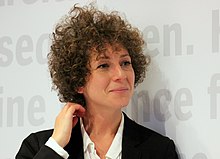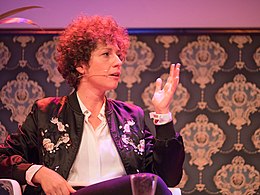Marianna Salzmann
 From Wikipedia the free encyclopedia
From Wikipedia the free encyclopedia
Marianna Salzmann | |
|---|---|
 "Саша"/"Sasha" Marianna Salzmann Heike Huslage-Koch, 2017 | |
| Born | 21 August 1985 |
| Alma mater | University of Hildesheim Berlin University of the Arts |
| Occupation(s) | dramatist essayist novelist |
Sasha Marianna Salzmann (born in Volgograd, Soviet Union on 21 August 1985) is a German playwright, essayist, theatre curator and novelist.[1][2] She is writer in residence at the Maxim Gorki Theatre in Berlin where she was artistic director of the studio theatre, Studio Я, from 2013 to 2015.[3][4][5]
Life[edit]
Salzmann grew up in Moscow until 1995, when she and her family emigrated to Germany as Jewish "Quota refugees" ("Kontingentflüchtlinge"). She studied literature, drama and media studies at the University of Hildesheim and creative writing for the stage at the Berlin University of the Arts.
Theatre career[edit]
Throughout her studies in Hildesheim, she had poems and short stories published in various magazines, and, together with Deniz Ultu, Mutlu Ergün, Marcela Knapp and Mike Klesse, she founded the cultural and social magazine freitext, where she was editor from 2002 to 2013.[6][7] Alongside her studies, she also staged two plays with Wera Mahne: Ein Attentat auf Godot (‘An Attempt on Godot’), a loose adaptation of Beckett’s classic,[8][9] and Rot Werden (‘Turning Red’), a sarcastic romantic monologue to Vladimir Putin.[10][11][12] In collaboration with the music theatre collective forte blau, Salzmann developed projects for the deaf, hard of hearing and hearing.[13] With Grenzkollektiv, she created a parody of the Joan of Arc story—Jeanne ist tot und kommt heute nicht mehr vorbei (‘Joan’s Dead and Won’t be Coming Round Today’).[14]
During her studies in Berlin, Salzmann’s first full-length play Weißbrotmusik (Engl.: "white bread music") won the Wiener Wortstaettenpreis 2009[15][16] and the IKARUS Prize for Best Youth Play 2012.[17] In 2012, she was also awarded the Kleist Prize for Young Dramatists for her play Muttermale Fenster blau,[18] and in 2013, her graduation play Muttersprache Mameloschn (Engl.: "mother tongue Mameloschn")[19] won the Mülheim Audience Award for Play of the Year and was voted Best Play by theatre critics.[20] In 2018, she was awarded the Nestroy Theatre Prize for best off production for that same play.
In 2014, she and Maxi Obexer co-founded the NIDS, Neues Institut für Dramatisches Schreiben (Engl.: "New Institute for Writing for the Stage"),[21][22] an institute whose purpose is to raise public awareness of the societal importance of the art of drama, and to strengthen a kind of art whose original function was to encourage a type of culture that encourages critical debates and discussions.

Since 2013, Salzmann has been writer in residence at the Maxim Gorki Theatre Berlin,[3] where she previously headed the Conflict Zone Arts Asylum collective at Studio Я,[23] an "undernational network of artists, activists, authors, performers and curators who believe that aesthetics is the better ethics, art the better politics, language the most powerful force."[24]
‘The Maxim Gorki Theatre is the “Theatre of the Year”,’ Welt journalist Stefan Grund wrote. ‘One reason is Sasha Marianna Salzmann who is director of the most exciting experimental theatre in Germany—Studio Я.’[25] In 2016, the verdict of German theatre magazine Die Deutsche Bühne was equally enthusiastic: ‘Salzmann, with her sensitive eye for the brutality of the present age and her biographical glimpses into the past, is perhaps the German-language dramatist of the moment’ (Detlev Baur).[26]
Together with Max Czollek, Salzmann curated the ‘Disintegration Congress’ (2016)[27] and the ‘Radical Jewish Culture Days’ (2017),[28][29] two social sculptures where international figures addressed questions of contemporary Jewish identity. ‘The Maxim Gorki Theatre used to be a post-migrant theatre,’ Dirk Pilz wrote in the Berliner Zeitung. ‘Now it’s a disintegration theatre. Disintegration means: I’m not joining in. The one thing it doesn’t mean is: I’m keeping out of this.’[30] As part of the Radical Jewish Culture Days, Salzmann directed Die Geschichte vom Leben und Sterben des neuen Juppi Ja Jey Juden (‘The Life and Death of the New Yippee Yeah Yeah Jew’), a theatre monologue by Sivan Ben Yishai.[30][31][32]
Prose[edit]
During a residency at the Tarabaya Arts Academy in Istanbul in 2012/13, Salzmann began work on her debut novel, Beside Myself,[33] which she finished writing on subsequent visits to Turkey. The novel was published by Suhrkamp in September 2017.[26] It is about twins who grow up first in a small flat in post-Soviet Moscow and then in an asylum home in provincial West Germany and, at the same time, it is the story of a Jewish family over four generations. Salzmann was awarded the Jürgen Ponto Foundation Prize for Literature for her debut.[34] The jury described Beside Myself as a ‘daring and accomplished balancing act between cultural and gender identity’ and ‘a multifaceted panorama of generations from the Soviet Union of the twentieth century to present-day Europe.’ The novel was also on the 2017 German Book Prize shortlist and in 2018 Salzmann won the Mara Cassens Prize for her ‘deeply provocative debut novel’.[35] Beside Myself has been translated into fifteen languages.
Works[edit]
- Salzmann, Marianna (2021). Im Menschen muss alles herrlich sein : Roman (in German). Berlin: Suhrkamp Verlag. ISBN 978-3-518-43010-1. OCLC 1266337635.
- —— (2017). Ausser sich Roman (in German). Berlin: Suhrkamp Verlag. ISBN 978-3-518-42762-0. OCLC 984748672.
English translations[edit]
- Salzmann, Marianna; Taylor, Imogen (2019). Beside myself. New York. ISBN 978-1-892746-44-3. OCLC 1110145818.
{{cite book}}: CS1 maint: location missing publisher (link)
French translations[edit]
- Salzmann, Marianna; De Oliveira, Claire (2019). Hors de soi : roman (in French). Paris. ISBN 978-2-246-81534-1. OCLC 1089433603.
{{cite book}}: CS1 maint: location missing publisher (link)
Spanish translations[edit]
- Salzmann, Sasha Marianna (2020). Fuera de si (in Spanish). Barcelona: Seix Barral. ISBN 978-84-322-3611-2. OCLC 1158415493.
References[edit]
- ^ "Sasha Marianna Salzmann, deutsche Schriftstellerin". Munzinger-Archiv GmbH, Ravensburg. Retrieved 12 February 2018.
- ^ "Shooting-Star der deutschen Literaturszene". Bayerischer Rundfunk, München. 26 November 2017. Retrieved 12 February 2018.
- ^ a b Tobias Hausdorf (8 September 2017). "Wer bestimmt deine Identität?". Generationenroman "Außer sich" .... Migration, Antisemitismus, Identität: Sasha Marianna Salzmann, Hausautorin des Berliner Gorki-Theaters, erzählt in ihrem Debütroman "Außer sich" die mitreißende Geschichte einer jüdischen Transperson. Der Spiegel (online). Retrieved 12 February 2018.
- ^ "Was passiert im Studio Я?". Deutschlandradio (Deutschlandfunk Kultur), Köln. 11 March 2015. Retrieved 12 February 2018.
- ^ "Sasha Marianna Salzmann".
- ^ "Sasha Marianna Salzmann Personal Website".
- ^ "Marianna Salzmann – freitext". freitext (in German). Retrieved 2019-03-24.
- ^ "Off-Theater-Festival FAUST-Spiele 2007" (PDF). Kulturzentrum FAUST. 1 November 2007. Retrieved 24 March 2019.
- ^ "Salzmann, Marianna". Stadt Mülheim an der Ruhr (in German). 2013-03-03. Retrieved 2019-03-24.
- ^ "BALLHAUS NAUNYNSTRASSE:: Event – Einzelansicht – 3s". p106499.typo3server.info. Retrieved 2019-03-25.
- ^ "Путин как объект желания | DW | 14.06.2012". DW.COM (in Russian). Retrieved 2019-03-25.
- ^ Anna Pataczek (3 March 2012). ""Putin ist ein neuer Typus Mann"". Die Berliner Dramatikerin Marianna Salzmann über die Wahlen in Russland. Verlag Der Tagesspiegel GmbH, Berlin. Retrieved 13 February 2018.
- ^ "Sasha Marianna Salzmann | Geistern folgen" (in German). Retrieved 2019-03-25.
- ^ "COMMEDIA FUTURA: Grenzkollektiv – Weltrettungsauftrag | 03.11.2011 20:00, Hannover – Spielplan Freier Theater in Niedersachsen -". www.laft.de. Retrieved 2019-03-25.
- ^ Huber-Lang, Wolfgang. "Ventil der Gewalt – Nestroyhof mit "Weißbrotmusik"". Bühne – Wiener Zeitung Online (in German). Retrieved 2019-03-25.
- ^ "Marianna Salzmann". Wiener Wortstaetten. Retrieved 13 February 2018.
- ^ "IKARUS 2012". jugendkulturservice.de (in German). Retrieved 2019-03-25.
- ^ Kasch, Georg. "Kleist-Förderpreis für Marianna Salzmann". nachtkritik.de (in German). Retrieved 2019-03-25.
- ^ "Muttersprache Mameloschn". Stadt Mülheim an der Ruhr (in German). 2013-03-03. Retrieved 2019-03-25.
- ^ Berlin, Deutsches Theater. "Deutsches Theater Berlin – Muttersprache Mameloschn, von Sasha Marianna Salzmann". www.deutschestheater.de (in German). Retrieved 2019-03-25.
- ^ NIDS. "Nutshell | NIDS | Neues Institut für dramatisches Schreiben" (in German). Retrieved 2019-03-25.
- ^ "NIDS – Neues Institut für Dramatisches Schreiben [launch]". Entercom Communications Corp. Retrieved 13 February 2018.
- ^ "Sasha Marianna Salzmann". Sasha Marianna Salzmann | Gorki (in German). Retrieved 2019-03-25.
- ^ "STUDIO Я CONFLICT ZONE ARTS ASYLUM". Gorki Theater. Retrieved 2020-02-25.
- ^ Stefan Grund (8 July 2015). "Die Ya-Sagerin aus Berlin". Das Maxim-Gorki-Theater ist das „Theater des Jahres“. Das liegt auch an Marianna Salzmann, die dort die spannendste Experimentierbühne Deutschlands leitet. Axel Springer SE (WELT digital), Berlin. Retrieved 13 February 2018.
- ^ a b "Beside Myself: Novel von Sasha Marianna Salzmann – Suhrkamp Insel Bücher Buchdetail". www.suhrkamp.de. Retrieved 2019-03-25.
- ^ "Desintegration | Kulturstiftung des Bundes". www.kulturstiftung-des-bundes.de. Retrieved 2019-03-25.
- ^ ""Radikale Jüdische Kulturtage" am Maxim Gorki Theater – Ein Festival der Provokation und Selbstbefragung". Deutschlandfunk Kultur (in German). Retrieved 2019-03-25.
- ^ "Radikale Jüdische Kulturtage". Radikale Jüdische Kulturtage | Gorki (in German). Retrieved 2019-03-25.
- ^ a b "Sasha Marianna Salzmann | RADIKALE JÜDISCHE KULTURTAGE" (in German). Retrieved 2019-03-25.
- ^ Hift, Gabi. "Die Geschichte vom Leben und Sterben des neuen Juppi Ja Jey Juden / Celan mit der Axt – Mit zwei Monologen eröffnen die Radikalen Jüdischen Kulturtage am Berliner Maxim Gorki Theater". nachtkritik.de (in German). Retrieved 2019-03-25.
- ^ "Maxim Gorki Theater – Radikal für eine neue jüdische Leitkultur in Deutschland – MiGAZIN" (in German). 2017-11-09. Retrieved 2019-03-25.
- ^ Nopca, Jordi (2020-01-25). ""Els nostres drets perillen i ens costarà molt recuperar-los"". Ara.cat (in Catalan). Retrieved 2021-02-02.
- ^ "Literaturpreis der Jürgen Ponto-Stiftung 2017 / Sasha Marianna Salzmann für "Außer sich" prämiert". www.boersenblatt.net (in German). Retrieved 2019-03-25.
- ^ "Mara-Cassens-Preis an Sasha Marianna Salzmann". Literaturhaus Hamburg (in German). 2017-11-01. Retrieved 2019-03-25.